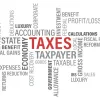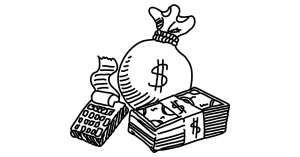Knowing how to manage your money is no small feat. It takes some time to plan and record your finances effectively, but successful money management can bring a variety of benefits. Not to mention, developing your skill in personal finance is a smart defense against financial difficulties and debt. Unfortunately, these financial skills are rarely taught in schools, leaving many of us struggling to catch up.
So, what areas of money management does personal finance cover and which ones should you focus on now for the best results? In this guide, we’ll cover the importance of personal finance and the easiest ways to start managing your money. With these tips, you’ll change the way you think about money and get a head start on achieving your financial goals.
What Is Personal Finance?
Personal finance is an umbrella term that refers to managing your money. This planning may be through a monthly budget, a tax calculator, a retirement fund, or an estate plan. Personal finance also encompasses any investments and loans you may need to plan for.
Keeping on top of your personal finances can:
Help You Understand Money - If you don’t keep track of what you’re spending and when it can lead to a misunderstanding of the value of your money. By planning your personal finances using income and outgoings over a set period, you’ll know whether a purchase is out of your reach and how much you’ll need to earn to balance things out.
Help You Set and Achieve Financial Goals - By better understanding your money, you can decide what you want to work towards. This can be in the short term, such as a vacation or a new car, or long-term, such as a mortgage, your child’s education, or your retirement. By keeping track of, and budgeting, your money, you can follow a personal finance plan, start saving, and know exactly how long it will be before you’ll achieve your goal.
Establish Income Streams - Having a set plan for your money and clear goals to work toward will also let you know how much you need to earn. Budgeting is a skill that is vital in setting up a business, so by managing your personal finances, you’ll be well-equipped to set up other income streams. Or, you can look into investing the money you’re earning, and receiving regular dividends.
Keep You Clear - Knowing exactly where your money is going and when is the best way to make sure your earnings are higher than your outgoings. Any sudden economic difficulties or surprise payments will be much easier to deal with when you know how they will affect your personal finance plans. If you’re struggling to pay off a loan, getting everything down on a budget planner can relieve stress, giving you a clear pathway to paying off debt.
Personal Finance Tips
- Create a Personal Finance Calendar.
In addition to being a simple way to maintain long-term financial records, a personal finance calendar can give you control over your day-to-day spending. There are varying levels of complexity when it comes to personal finance calendars. However, for the most basic you’ll need to note down your income, regular outgoings (such as bills, standing orders, etc.), your spending, and your savings. Usually, these calendars can last a month at a time, but if you really want to break down your personal finance you can create a 7-day personal finance calendar.
- Create Habits
Managing your personal finance well is a long-term prospect. The best way to ensure you regularly note down your income, outgoings, purchases, and savings is to turn budgeting into a habit. Whatever you need to do to make personal finance second nature is worth it. For example, you might like to carry a notepad small enough to carry around with you, to note down purchases as soon as you make them. This also goes for savings. Having a goal for the amount you’ll be saving each week and habitually saving money will protect you from any surprise outgoings and help you plan. Looking back at how much you’ve saved is a great reward for being diligent with your personal finances.
- Discuss Goals and Priorities
This tip can be especially important if you have children or are planning to have a family. If you and your partner have joint financial responsibilities, personal finances can encompass both of you. It’s beneficial to establish what you’ll be working toward, so you can both give your all to joint purchases, and know exactly where you are with your own finances. Setting joint goals for the coming month can help with long-term planning, and make your partner aware of your personal goals.
- Be Smart With Loans
Loans can be a great way to achieve your goals faster, as long as you know you’ll be able to pay them off. However, a long-term loan can be a drain on your finances, sometimes even for decades at a time. If you have a long-term loan, chances are all of your goals will be affected by regular loan payments. Work towards paying off any long-term loans and high-interest loans, such as credit card loans, as a priority. When it comes to your mortgage, things are a little different. Check with your provider whether you can adjust the rate you pay monthly and extend your term to fit around your personal finance goals.
- Explore Investing
Sometimes we can be so focused on saving we forget there are ways to increase our savings. Of course, most investing will carry some deal of risk, so scan your general income and outgoings and make sure you could take a potential loss. However, if you have some savings gathering dust, investing can also see you achieve your goals a lot faster. You can invest as little or as much as you want, and some investment opportunities such as houses or shares, are often particularly safe. If you are new to investing, seeking advice can be a big help in deciding whether it’s right for you.
- Treat Yourself
Who doesn’t love an impulse purchase every now and again? Budgeting your personal finance is less about stopping yourself from getting what you want, and more about learning to evaluate whether a purchase is worth it. When you know how much one purchase is worth compared to your income, and how that purchase will affect your finances a month from now, you can make sure that it’s a good one. While setting long-term goals is important, it’s good to enjoy your savings sometimes.
- Planning Your Taxes
Taxes are one of the most important parts of personal finance. After all, everybody pays them, and they’re not going anywhere. So, knowing how much of your money is going to tax payments can help you get a deeper level of control over finances. The chances are that your accounts have different tax exemptions, so learning about these will help make sure your personal finance plan is tax efficient. For example, one way to reduce tax is to save with a retirement plan or an IRA.
- Be Flexible
Once an individual has opened their first bank account, they will rarely open many other accounts with different banks. This is why banks offer such great interest rates for first-time bankers. However, the longer you’ve had your account, the more your interest rates may drop. It’s worth re-evaluating your accounts and insurance providers to ensure you’re receiving the best interest rates you could be. Switching bank accounts does mean moving money around, but being flexible may be the key to achieving your personal finance goals.
- Keep Learning
Personal finance can be quite a complex topic, especially when you start to get into the smaller, but no less important, details. Starting simple is far better than not managing your personal finances at all, so only do what you’re comfortable with. However, if you’re serious about maximizing your savings and achieving your personal financial goals, dive deeper into what personal finance can bring you. There are many financial literacy courses available from renowned tutors, and enlisting the help of a financial advisor can guide you in the right direction and prepare you for the future.
Conclusion
Personal finance can take a while to master, but you can start managing your finances whenever you like. It’s best to get into the habit of budgeting and saving your money every week or month, by noting down your income, any bills you pay, your savings, and any and all purchases you make.
You should also take note of any accounts you have, any loans you have, and where you are storing your savings. By recording how these affect your net worth, and your overall income vs. outgoings, you’ll be able to plan for both long-term and short-term financial goals. Remember, your personal financial plan only has to be as in-depth as you need it to be and can change with your, and your family’s, priorities. Good luck!
Sources
- https://www.themuse.com/advice/50-personal-finance-tips-that-will-change-the-way-you-think-about-money
- https://www.moneyfit.org/how-to-change-the-way-you-think-about-money/
- https://www.investopedia.com/terms/p/personalfinance.asp
- https://www.wikijob.co.uk/finance/saving-budgeting/personal-finance-tips
- https://www.lettingagenttoday.co.uk/the-importance-of-having-good-personal-finance-management
- https://www.investopedia.com/terms/t/tax-planning.asp
- https://www.investopedia.com/guide-to-financial-literacy-4800530
- https://www.moneyhelper.org.uk/en/everyday-money/budgeting/beginners-guide-to-managing-your-money





















One comment
Accounting Expert
Wow, this article really got me thinking differently about money! It’s true, our mindset plays such a huge role in how we handle our finances and ultimately live our lives. Thanks for sharing these insights.